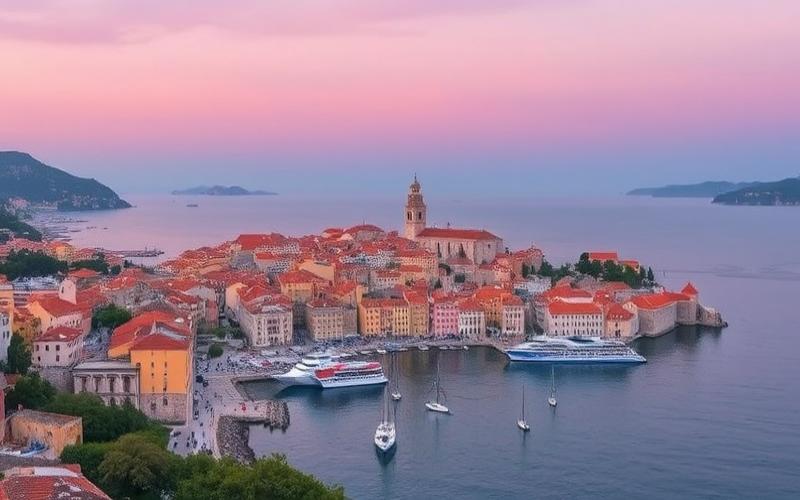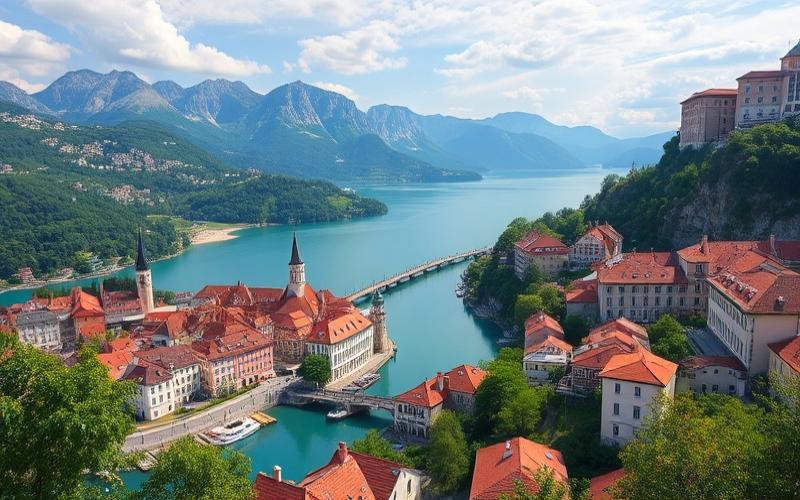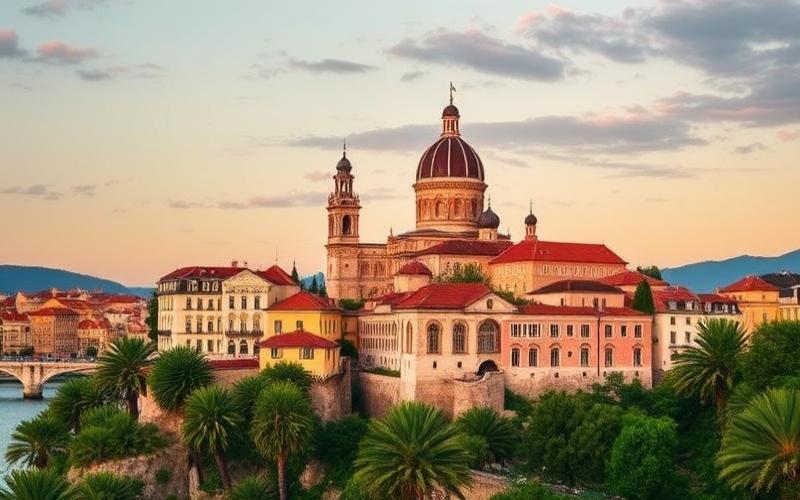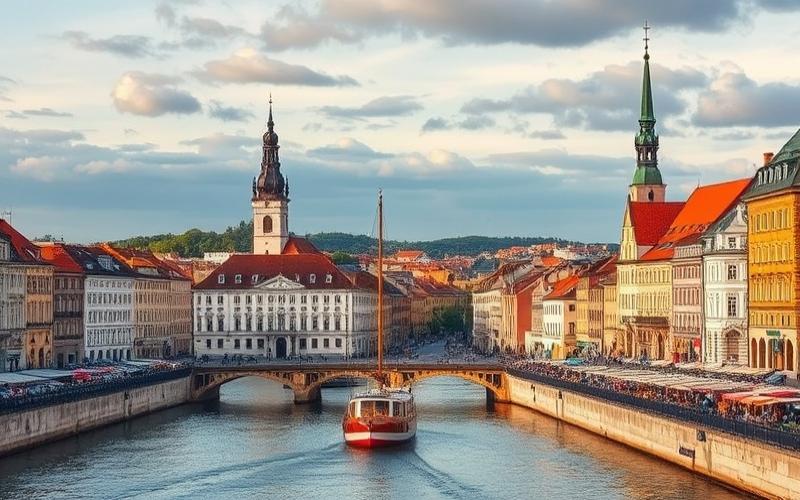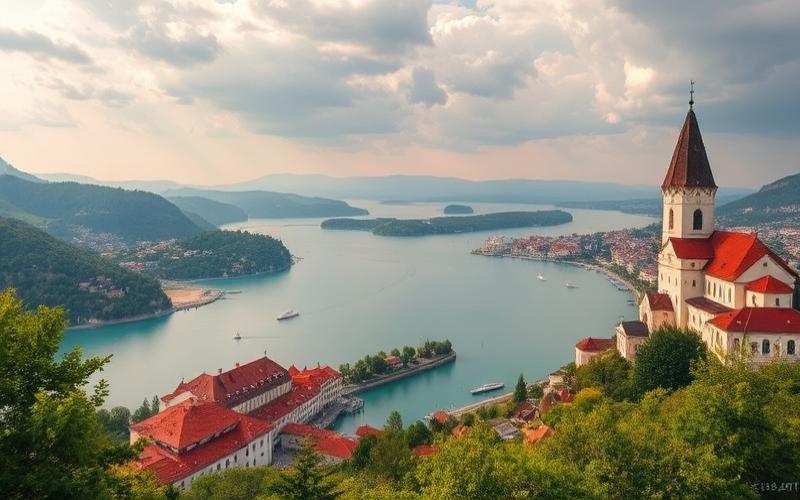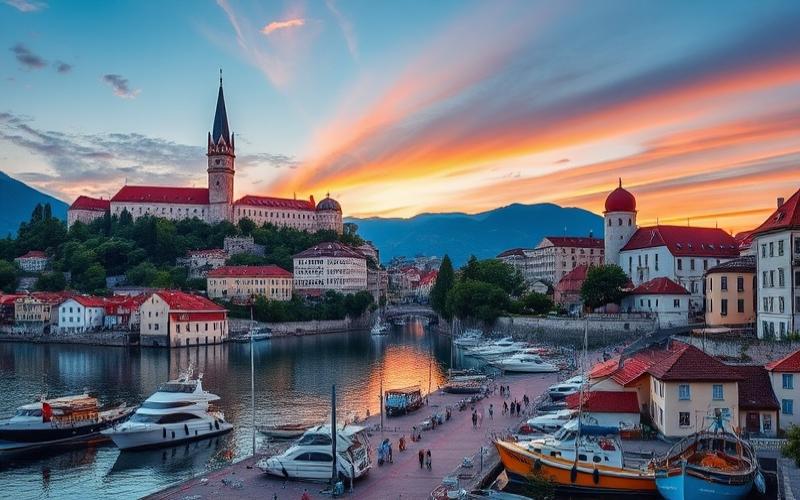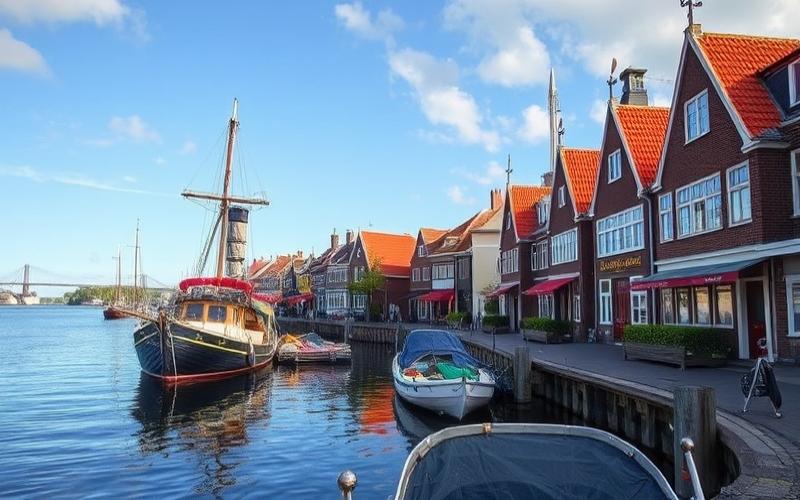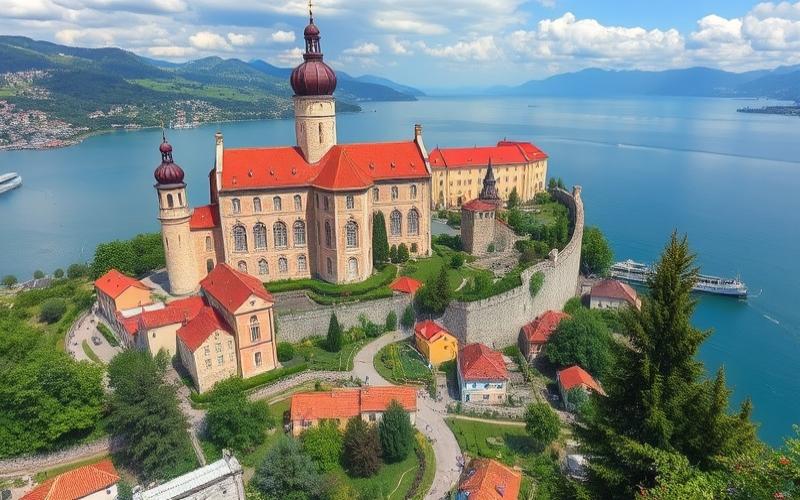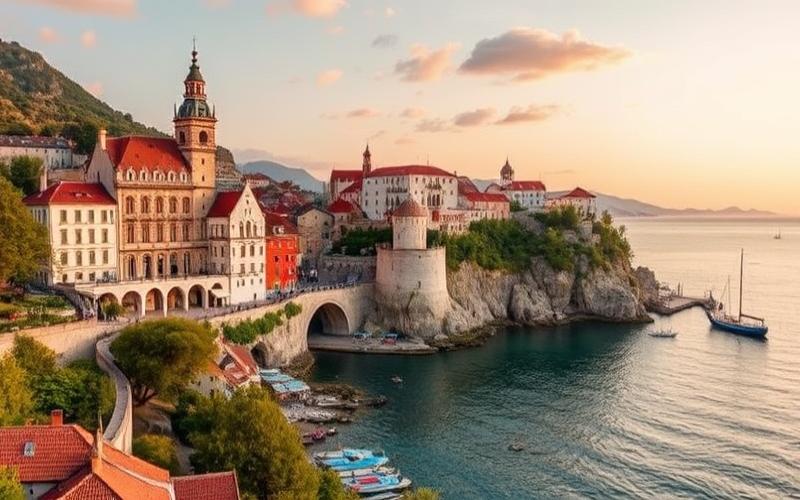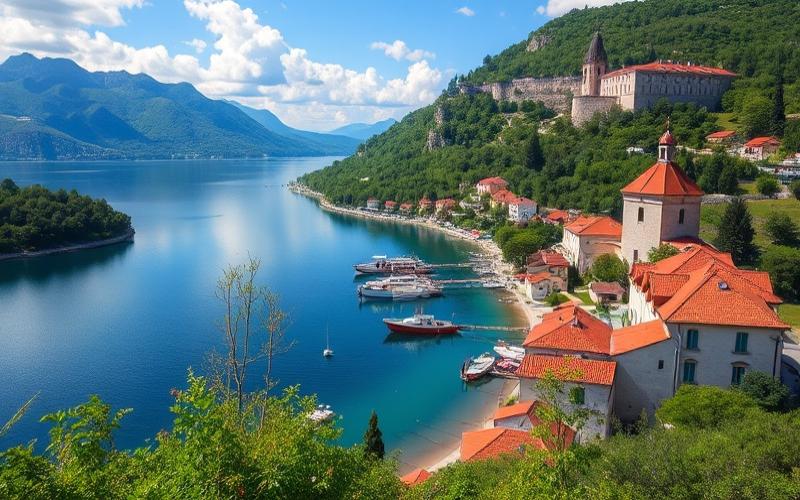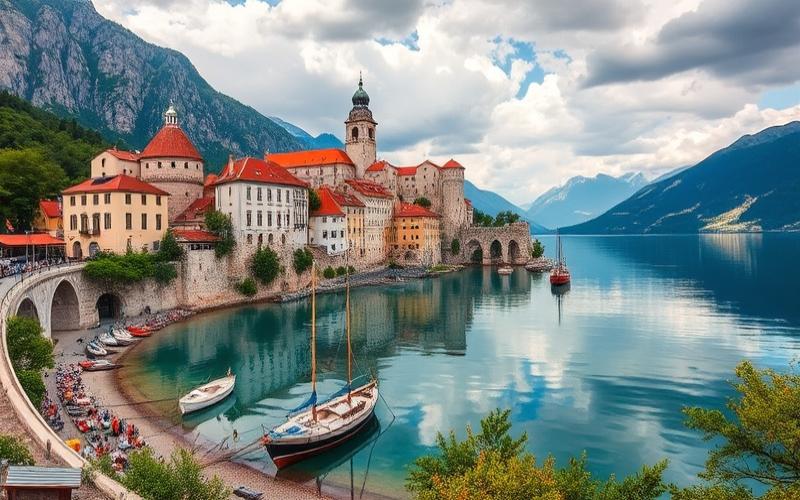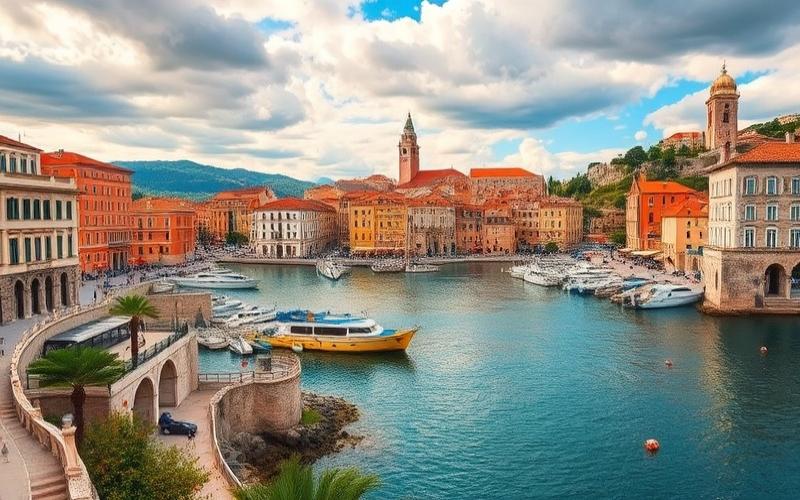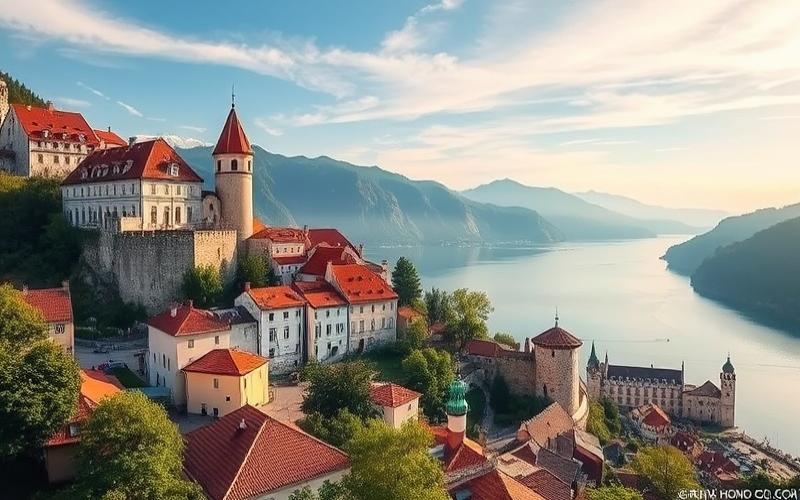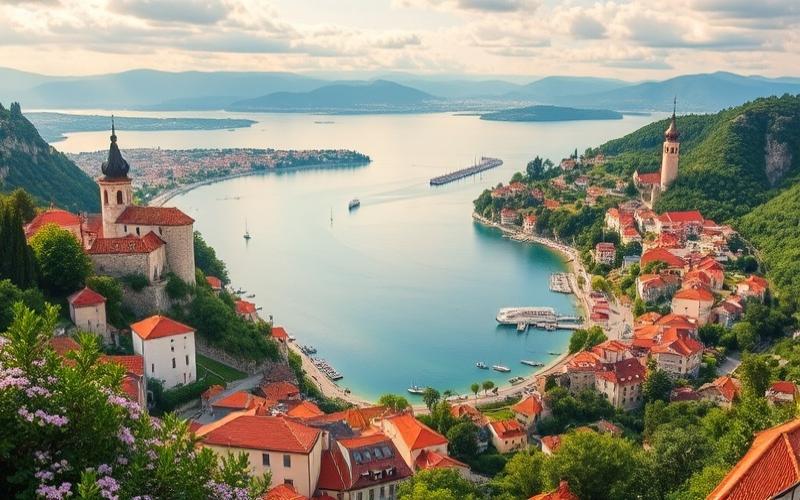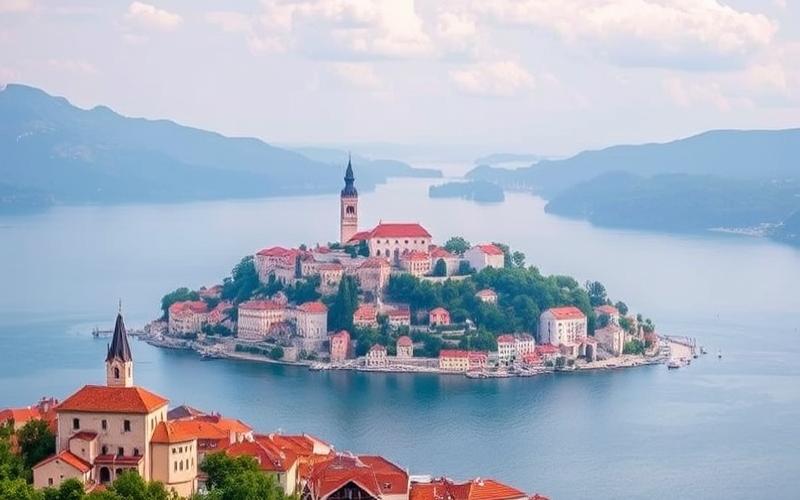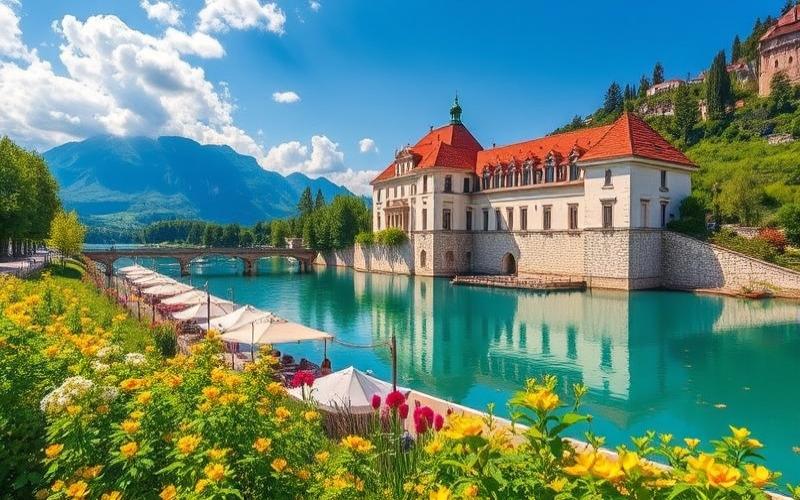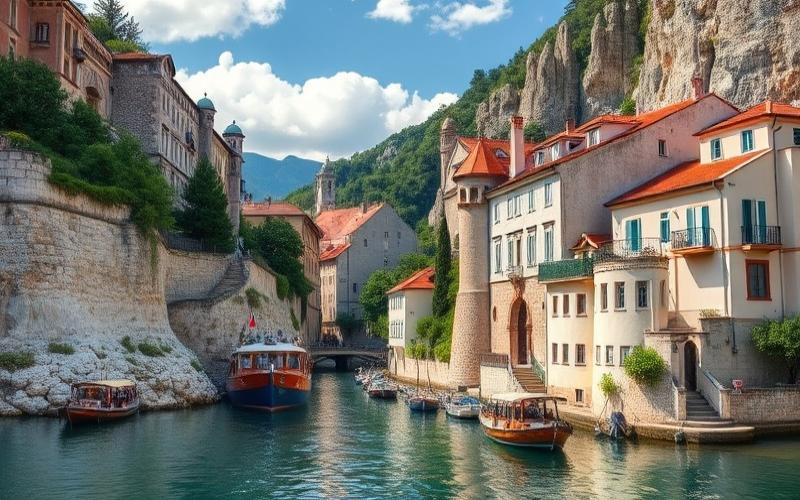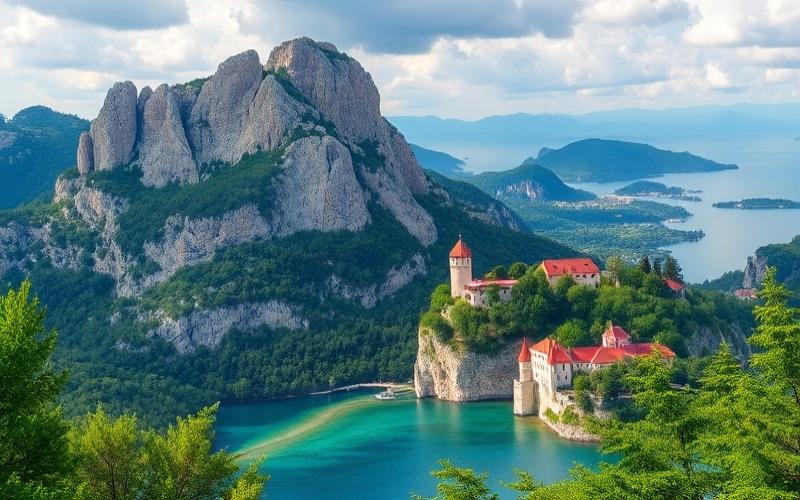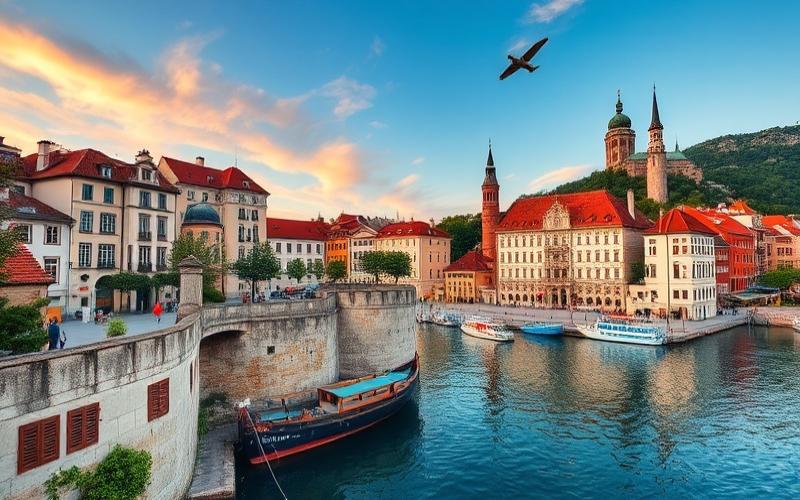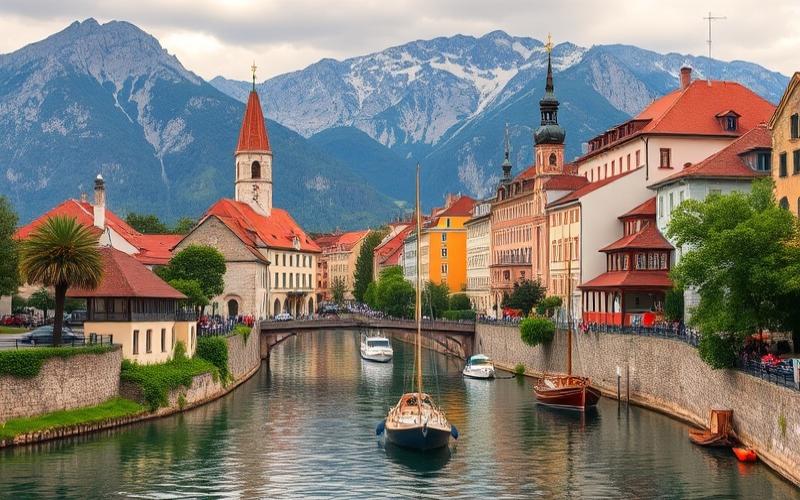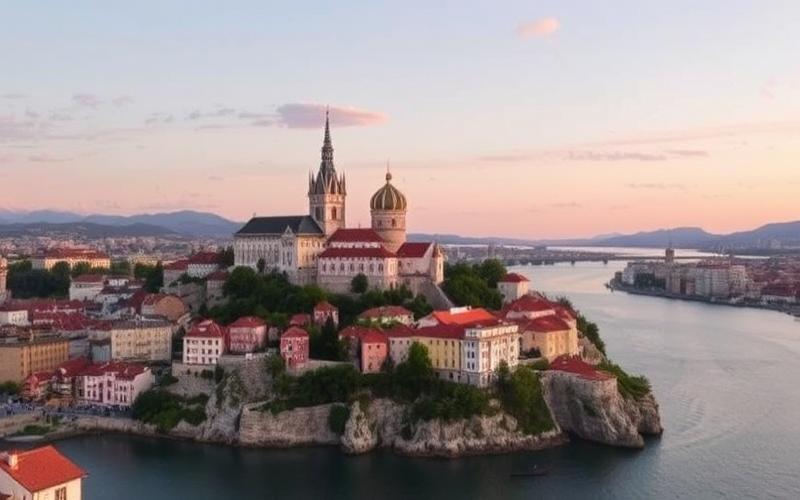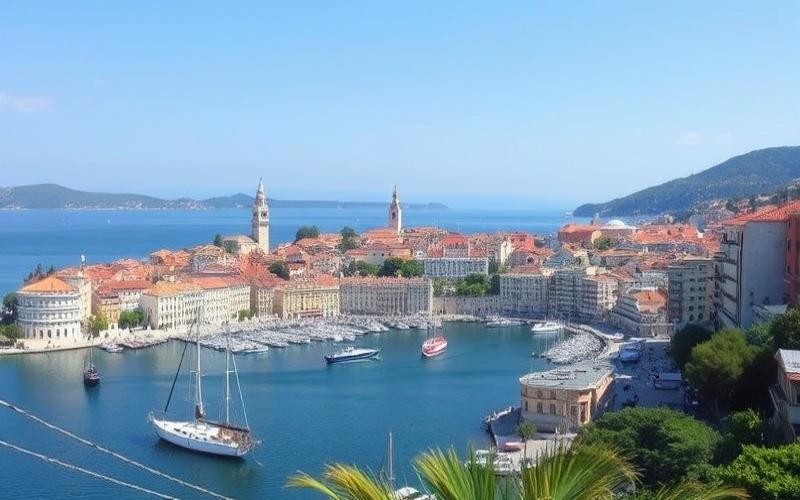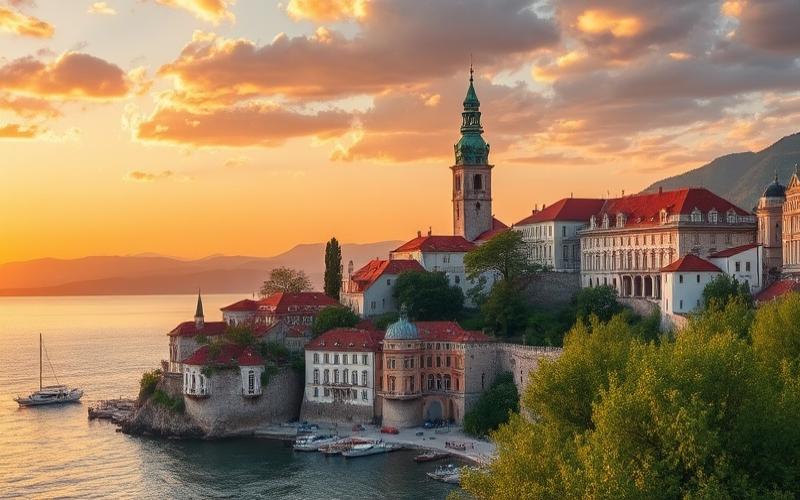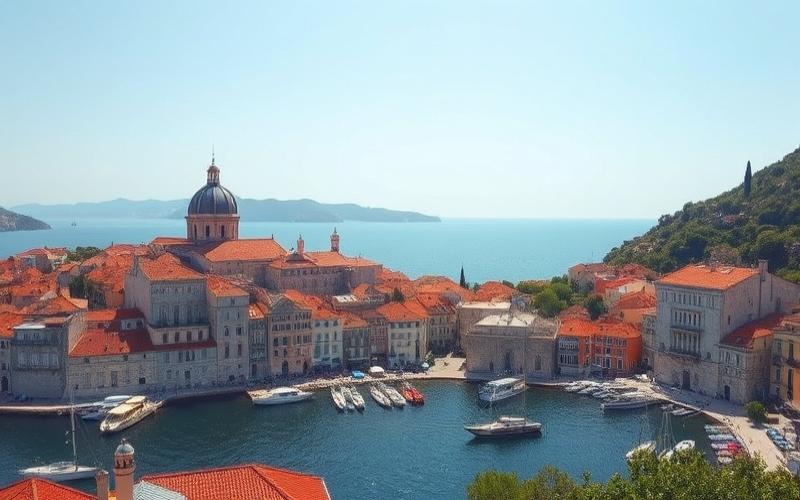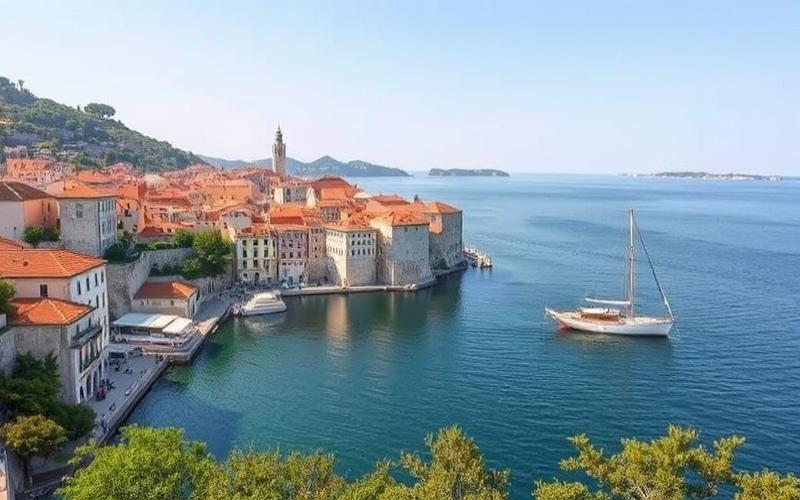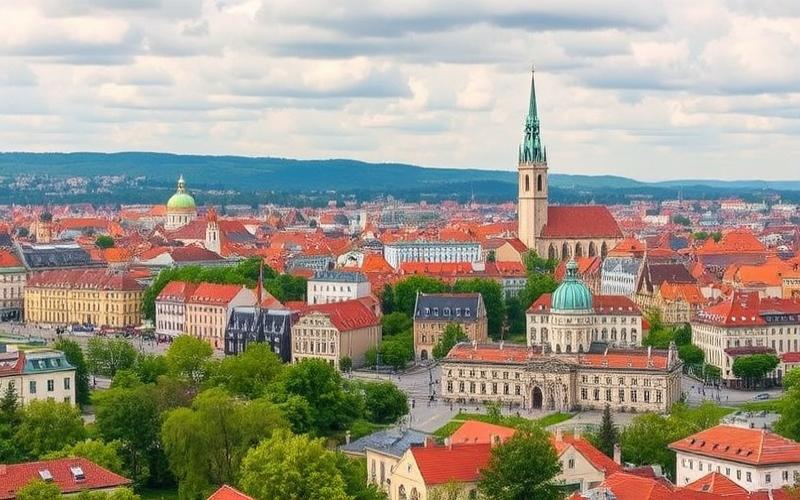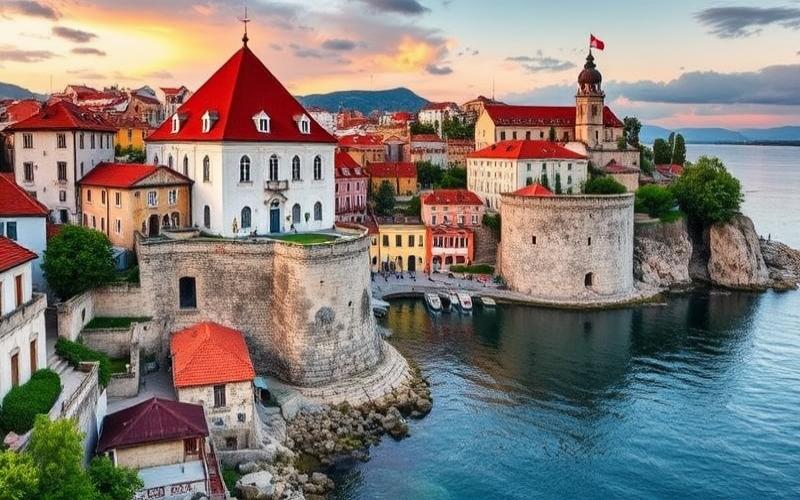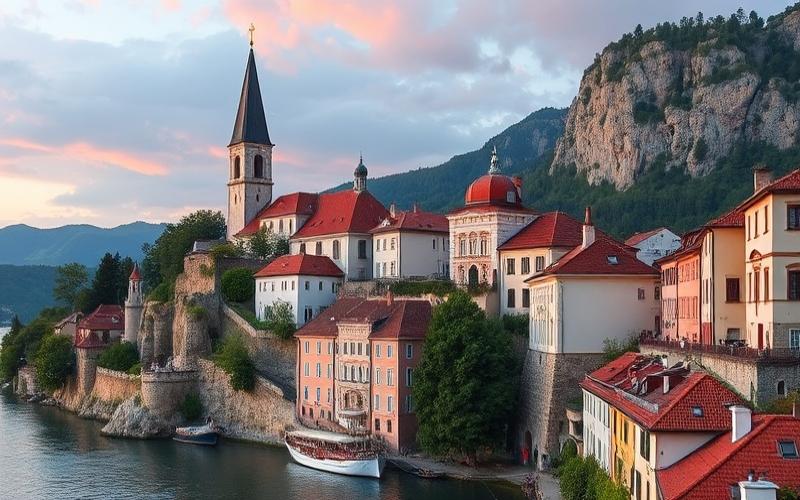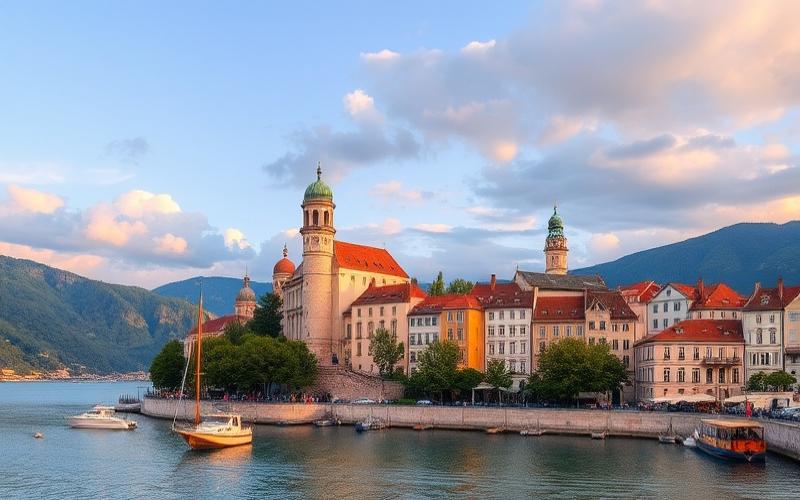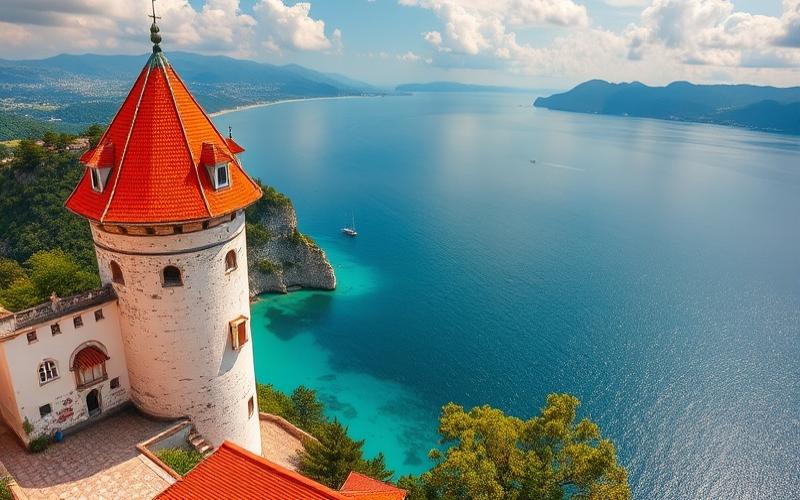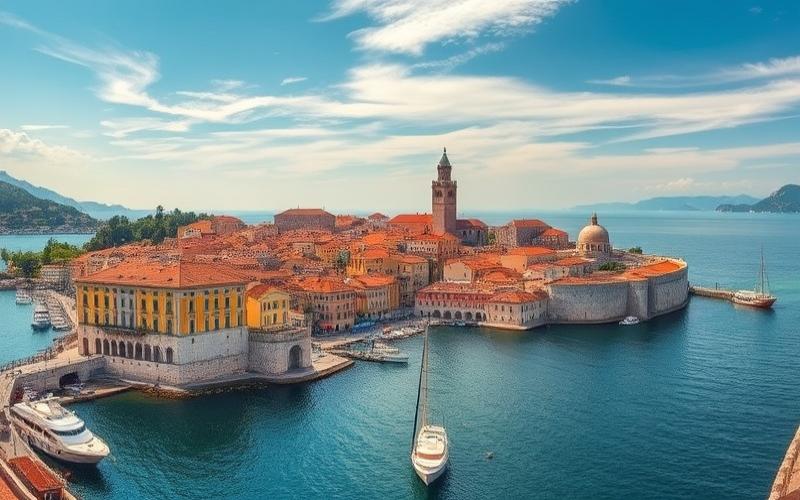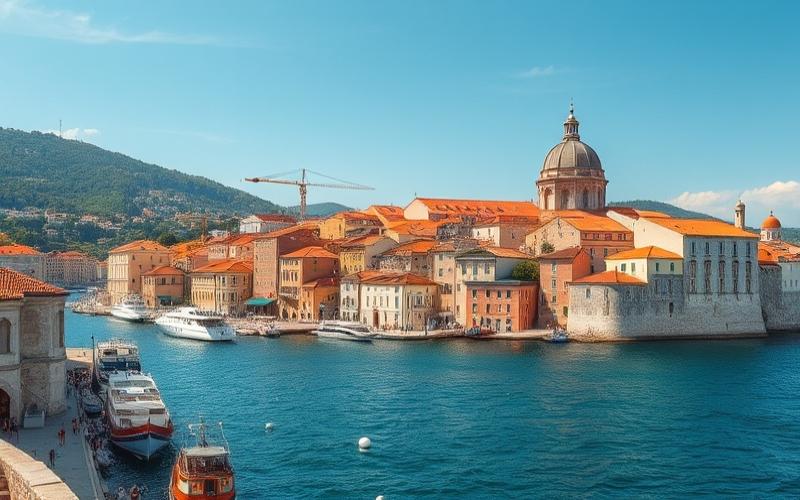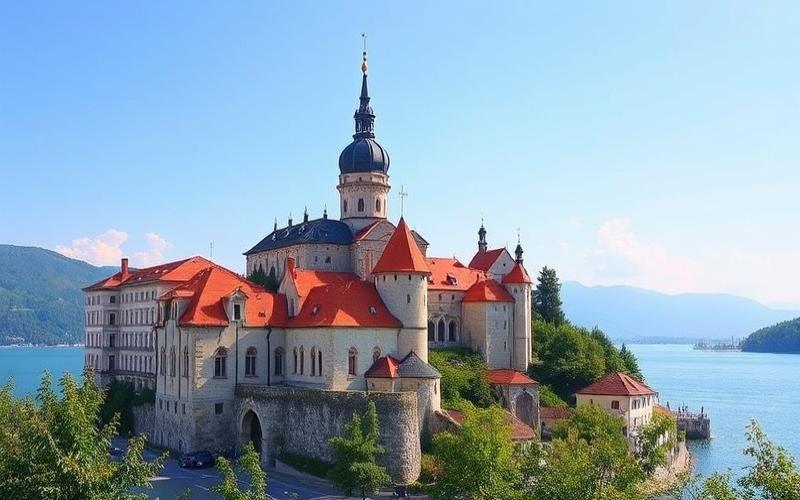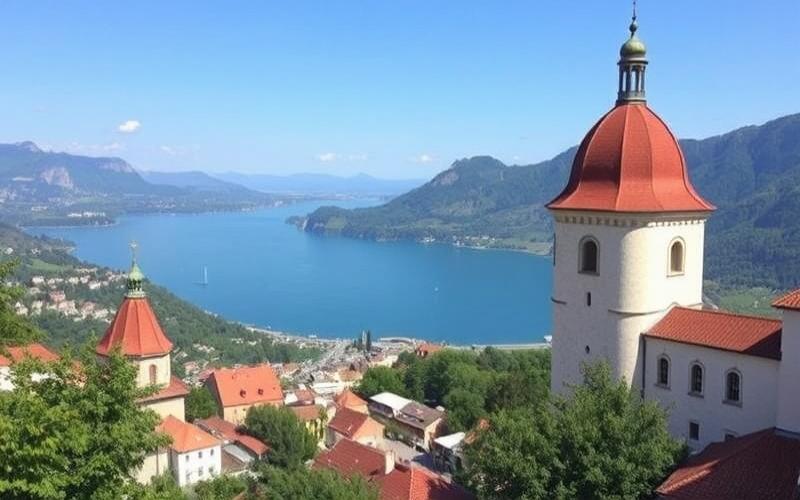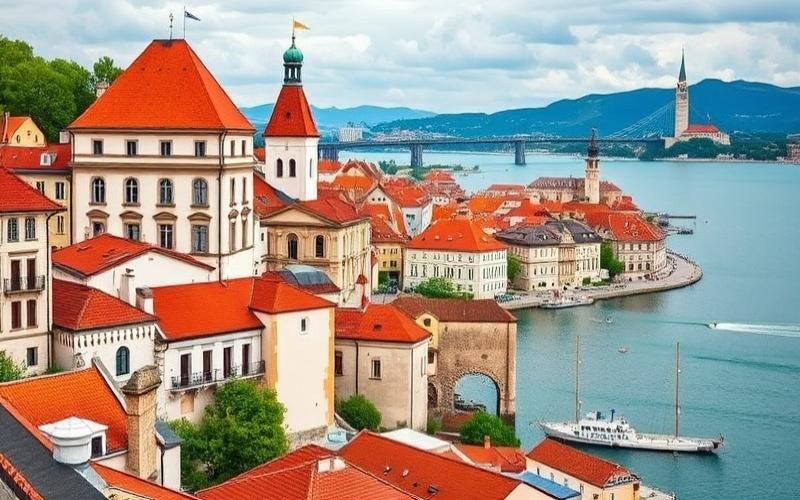
 Published on and written by Cyril Jarnias
Published on and written by Cyril Jarnias
Croatia, with its strategic geographic position and growing openness to the European market, is becoming a magnet for industrial real estate. The country stands out for its numerous free zones, offering significant tax and logistical advantages, which represent numerous opportunities for investors seeking to optimize their operations in Southeastern Europe.
These zones, such as Pag Island, Zadar, and Rijeka, not only provide financial incentives but also modern infrastructure and easy access to key trade routes. Discovering these privileged spaces means entering a world where efficiency and profitability combine with a dynamic and promising business environment.
Introduction to Industrial Real Estate in Croatia and Its Free Zones
Industrial real estate in Croatia plays a central role in structuring the country’s economic fabric. It differs from other real estate segments (residential, commercial, or tourist) by its focus on production, logistics, storage, and industrial processing, meeting the needs of manufacturing, logistics, and technology companies.
Specifics of Croatian Industrial Real Estate:
- Mostly located near major transport routes, seaports (notably Rijeka), and strategic economic zones.
- Offers buildings suited for production, warehousing, and distribution.
- Designed to meet increasing energy and environmental standards.
- Integrated into industrial parks and free zones facilitating the establishment of foreign and local companies.
Historical Evolution of the Sector and Economic Impact:
Since independence, the industrial sector has experienced phases of growth followed by restructuring, accelerated by integration into the European Union.
Over the past twenty years, economic stabilization and an influx of foreign investment have enabled the modernization and expansion of the industrial park.
Industrial real estate supports GDP growth, employment, and economic diversification, particularly by fostering the establishment of export and logistics industries.
| Period | Key Evolution |
|---|---|
| 1990-2000 | Industrial decline, privatizations, reforms |
| 2000-2013 | Modernization, first industrial parks |
| 2013-Present | Growth, structuring, EU integration |
Concept and Appeal of Free Zones:
Free zones (or special industrial zones) are designated territories benefiting from a relaxed tax and regulatory regime to attract investment and encourage exports.
They offer advantages such as corporate tax exemptions or reductions, simplified customs procedures, investment subsidies, and modern infrastructure.
These zones aim to promote the establishment of foreign companies and energize the local industrial fabric.
Notable Examples of Free Zones in Croatia:
| Free Zone | Location | Tax and Regulatory Advantages | Key Industries |
|---|---|---|---|
| Rijeka Free Zone | Port of Rijeka | Tax exemptions, port logistics | Logistics, agri-food, metal |
| Split Free Zone | Dalmatia | Streamlined customs procedures, subsidies | Processing, export, warehousing |
| Osijek Free Zone | Slavonia | Investment support, reduced taxation | Agribusiness, machinery, IT |
Key Industries Present in Free Zones:
- Logistics and maritime transport
- Agri-food and agricultural product processing
- Machinery and metallurgical production
- Information technology and services
Recent Developments and Expansion Projects:
- Modernization of infrastructure in port areas (Rijeka, Split) to accommodate high-value-added logistics activities.
- Expansion of the Rijeka Free Zone to host technology companies and strengthen the European supply chain.
- New investment incentive policies, focusing on energy transition and industrial digitalization.
Key Takeaways:
- Industrial real estate in Croatia is a pillar of economic growth, supported by a stable environment and attractive incentives.
- Free zones are drivers of foreign investment and regional industrial development.
- Recent policies aim to enhance the sector’s attractiveness by modernizing infrastructure and adapting taxation to meet international investor expectations.
Good to Know:
Industrial real estate in Croatia plays a crucial role in its economy, with notable development since the transition to a market economy in the 1990s. Free zones, such as those in Rijeka and Krapina-Zagorje, offer investors substantial tax advantages like VAT and customs duty exemptions, attracting key industries in manufacturing, logistics, and technology. These free zones are distinguished by flexible regulations that simplify operations for local and international businesses, enhancing their appeal in the European market. Recent expansion projects aim to increase the capacity of these industrial hubs, amplifying their impact on economic growth and innovation in Croatia, particularly in emerging sectors like advanced manufacturing and green technologies.
The Advantages of Logistics Warehouses in Croatia for Investors
Strategic Locations and Connectivity
- Major Croatian logistics warehouses are located in close proximity to major transport routes:
- Major seaports: Rijeka (the largest Croatian port), Split, Ploče.
- European highways: Corridors linking Italy, Slovenia, Hungary, Serbia, and Bosnia and Herzegovina.
- Concrete example: The Kukuljanovo logistics center, 15 km from the Port of Rijeka, spans 7,000 m² and meets the growing demand for modern storage for Central and Southeastern Europe.
This location facilitates access to EU markets, optimizes delivery times, and reduces logistics costs.
Tax Incentives, Subsidies, and Regulations
- Access to specific tax incentives for foreign investors, particularly in special economic zones and industrial parks.
- Investment subsidies, especially for job creation, training, and integration of innovative technologies.
- Business-friendly regulations, simplified since EU accession: streamlined administrative procedures, competitive taxation, and the ability to repatriate profits without major constraints.
- EU membership guarantees the free movement of goods and access to a single market, facilitating cross-border trade.
Competitive Construction and Operating Costs
- Construction and operating costs for warehouses are lower than those in Western Europe.
- Skilled local workforce and moderate wage costs compared to EU standards.
- Attractive tax and land charges in many Croatian logistics regions.
Skilled Workforce
Presence of a workforce specialized in logistics, warehouse management, and handling.
Development of targeted training programs (technical universities, specialized schools) to meet sector needs.
Success Stories
| Company | Location | Achieved Results |
|---|---|---|
| Jadroagent Logistika DOO | Kukuljanovo, Rijeka | Rapid growth, modern warehouse, response to growing regional demand, anticipation of a new terminal opening in Rijeka in 2026 |
| SCPI Log In (logistics real estate) | Multiple sites | Above-average returns, stable income through long leases, regular cash flow for investors |
Growth Prospects and Innovations
- Technological developments: Warehouse modernization with automation, smart shelving, connected management systems, climate-controlled compartments for sensitive products.
- Expansion projects: Planned opening of new terminals in Rijeka and other ports, extension of logistics zones in strategic corridors.
- Civil and military synergies: Dual-use (civil/defense) logistics systems developed in Split and Rijeka enhance sector resilience and attractiveness.
- Market dynamics: Sustained growth driven by the rise of e-commerce, supply chain reorganization, and increased regional transit.
Key Takeaways
Strategic location, competitive costs, tax incentives, skilled workforce, and growth potential make Croatia a prime destination for logistics investment.
Croatia combines direct access to the European market, leading port and road infrastructure, attractive taxation, and logistics innovation dynamics, offering a highly competitive environment for international investors.
Good to Know:
Logistics warehouses in Croatia represent an attractive opportunity for investors due to their strategic location near highways like the A1 and seaports such as Rijeka and Split, ensuring quick and smooth access to European markets. As a member of the European Union, Croatia offers a favorable regulatory framework that facilitates cross-border trade, combined with attractive tax incentives and subsidies for foreign investors. The construction and operation of warehouses are also more competitive compared to many other European countries, and companies benefit from a skilled workforce in the logistics sector. Companies like DB Schenker have already demonstrated how investing in Croatia can become a significant growth lever, with a notable increase in their logistics efficiency. The sector is expanding rapidly, supported by technological innovations, and numerous extension and improvement projects are planned, reinforcing long-term growth prospects.
Focus on the Most Attractive Free Zones in Croatia
| Free Zone | Strategic Location | Tax Advantages | Dominant Industries | Infrastructure & Accessibility | Government Incentives & Partnerships |
|---|---|---|---|---|---|
| Rijeka Free Zone | Port of Rijeka, direct access to the Adriatic, near Italy and Central Europe | VAT and customs duty exemption, corporate tax reduction | Logistics, agri-food, raw material processing | Modern port terminal, rail and highway access, multimodal logistics | Investment subsidies, administrative simplification, agreements with EU partners |
| Split Free Zone | Port of Split, Southern Croatia, Mediterranean crossroads | Tax exemptions on imports/exports, reduced tax rate | Shipbuilding, biotechnologies, marine product processing | Direct port access, developed road network, proximity to international airport | Employment aids, facilitated access to European funds, regional bilateral agreements |
| Osijek Free Zone | Eastern Croatia, proximity to Hungary and Serbia | Corporate tax reduction, exemption from certain local taxes | Agribusiness, electronics, logistics, food processing | Equipped industrial park, connection to rail and highway network, access to the Danube | Regional subsidies, R&D incentives, cross-border partnership programs |
| Pula Free Zone | Northwest, Istrian peninsula, access to Northern Italy | Tax benefits on productive investments, property tax exemptions | Machinery, plastic processing, maritime industries | Modern industrial park, port proximity, road and airport connectivity | Innovation programs, export support, partnerships with Italy and Slovenia |
List of Key Benefits Observed in Croatian Free Zones:
- Tax exemptions: VAT, customs duties, corporate tax
- Simplified administrative procedures and one-stop shops
- Quick access to multimodal infrastructure (ports, roads, railways, airports)
- Proximity to European and non-European markets
- Financial incentives for investment, training, and job creation
- International partnerships (EU, neighboring countries, bilateral agreements)
Statistics and Recent Economic Impact:
Free zones contribute a significant share of FDI in Croatia, particularly due to capital inflows in the logistics, agri-food, and manufacturing sectors.
In 2024, Croatia recorded FDI growth in coastal areas, with increased investment in port logistics and high-value-added industries.
Regions hosting the main free zones, notably Rijeka, Split, and Osijek, show per capita GDP growth above the national average.
Examples of Testimonials from Established Companies:
“Access to the Port of Rijeka and VAT exemptions were decisive in our decision to set up our logistics center here. Administrative procedures are fast, and the local staff is qualified.”
Regional Director, international logistics group
“Thanks to tax incentives and support from the Split Free Zone, our biotechnology company was able to triple its production and easily export to Italy and Greece.”
CEO of an innovative SME
“The Osijek Free Zone allowed us to benefit from innovation subsidies and recruit engineers from the region. Proximity to the markets of Hungary and Serbia is a major logistics asset.”
Export Manager, agri-food company
Summary of Attractiveness Factors:
- Strategic location, access to major European and Mediterranean markets
- Tax advantages and targeted incentives
- Modern infrastructure and logistics connectivity
- Government support and openness to international partnerships
- Steady FDI growth and positive impact on local economic development
Good to Know:
In Croatia, free zones such as those located in Rijeka and Split stand out for their strategic location along major sea and land routes, offering exceptional logistics access. These zones benefit from attractive tax incentives, including partial tax exemptions for businesses. Industries thriving here include logistics, electronics, and agri-food. Modern infrastructure, such as well-developed ports and optimized transport networks, facilitates import-export. The Croatian government supports these zones through international partnerships and investment-friendly policies. According to the latest statistics, these zones have attracted over 500 million euros in foreign direct investment, significantly boosting local economic development. Entrepreneurs such as Ivan Marković, owner of an electronics company in Rijeka, highlight the practical benefits of reduced taxation and facilitated access to international markets.
Optimizing Industrial Real Estate Returns in Free Zones
Key Strategies and Practices to Maximize Industrial Real Estate Investment Returns in Croatia
- Leveraging Tax Advantages of Free Zones:
- Croatian free zones allow for the deferral or avoidance of a wide range of taxes (VAT, customs duties) on the import, manufacturing, storage, or processing of goods.
- These mechanisms offer optimized cash flow management, as taxation only occurs upon export or when goods leave the free zone.
- Investors also benefit from specific tax deductions for depreciation, research and development, as well as for doubtful debts.
- Real estate capital gains can be exempt if the property is held for more than two years, and certain rental incomes allow for the deduction of actual expenses.
- Economic Incentives and Attractiveness of Free Zones:
- Free zones contribute up to 19% of annual regional GDP and represent up to 6% of regional investments.
- Local authorities frequently offer setup assistance, employment subsidies, and infrastructure tailored to the logistics needs of businesses.
- Foreign investors are welcomed with incentive tax regimes, aiming to encourage industrial diversification and the creation of new activities.
- The Investment Promotion Act, currently under review, aims to further strengthen this attractive framework.
- Logistical and Infrastructural Aspects:
- Free zones are positioned near major transport routes (ports, highways, railways), facilitating the distribution and export of finished products.
- Modern infrastructure (warehouses, logistics platforms, energy networks) is designed to minimize operational costs and optimize the supply chain.
- The availability of a skilled workforce and proximity to European markets enhance their attractiveness.
- Proactive Asset Management to Optimize Profitability:
- Active management of industrial real estate assets allows for adjusting supply to market needs, optimizing occupancy rates, and anticipating economic cycles.
- A preventive maintenance policy, digitalization of lease management, and tenant diversification contribute to income stability.
- Adapting spaces (modularity, integrated services) increases attractiveness for various sectors (logistics, production, commerce).
Case Studies of Successful Investments in Croatian Free Zones:
| Project | Location | Sector | Key Success Factors | Optimized Return |
|---|---|---|---|---|
| Kukuljanovo Industrial Park | Rijeka | Logistics | Direct port access, modern infrastructure, centralized management, advantageous taxation | Occupancy rate >95%, annual rental growth |
| Ploče Free Zone | Southern Croatia | Agri-food | Investment subsidies, port proximity, VAT exemption on certain flows | Net margin above 20% over the first 5 years |
| Varaždin Industrial Zone | Northern Croatia | Electronics | Public-private partnership, training aids, tax deductions for innovation | Return on investment achieved in 4 years |
Observed Determining Factors:
- Access to port and logistics infrastructure.
- Regulatory stability and transparency of the tax regime.
- Responsiveness of local authorities and personalized support.
- Tenant diversification and continuous adaptation to market developments.
Summary of Best Practices for the Investor:
- Prioritize free zones benefiting from strong public support and major logistics connections.
- Ensure tax compliance and exploit all available deductions.
- Implement proactive and adaptable real estate management.
- Diversify uses and tenants to secure income streams.
- Monitor legislative developments, notably the Investment Promotion Act.
Good to Know:
To optimize the return on industrial real estate in free zones in Croatia, it is crucial to leverage tax advantages, such as exemption from VAT and customs duties. Economic incentives like employment subsidies and profit tax reductions also increase the attractiveness of these investments. Excellent logistics infrastructure, including developed road and maritime connections, facilitates access to European markets. Proactive asset management, including regular maintenance and adapting spaces to tenant needs, can significantly improve occupancy rates and profitability. Successful examples include the establishment of companies in the Rijeka Free Zone, where quick port access and financial incentives have fostered sustained growth.
Disclaimer: The information provided on this website is for informational purposes only and does not constitute financial, legal, or professional advice. We encourage you to consult qualified experts before making any investment, real estate, or expatriation decisions. Although we strive to maintain up-to-date and accurate information, we do not guarantee the completeness, accuracy, or timeliness of the proposed content. As investment and expatriation involve risks, we disclaim any liability for potential losses or damages arising from the use of this site. Your use of this site confirms your acceptance of these terms and your understanding of the associated risks.


